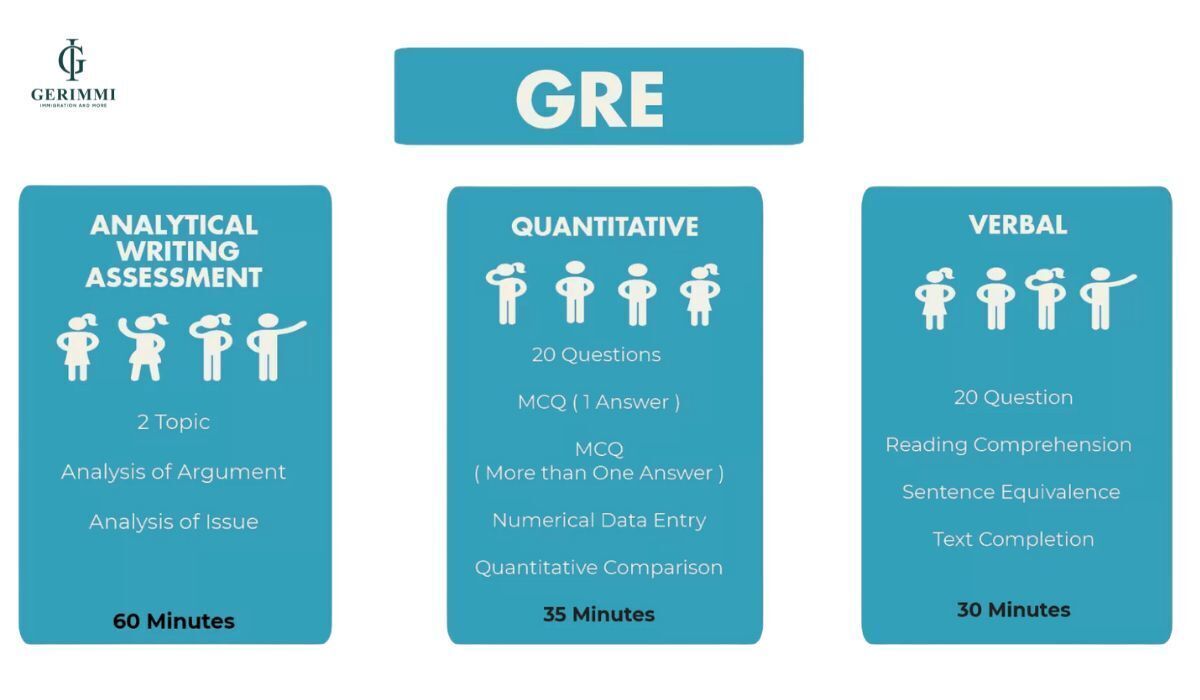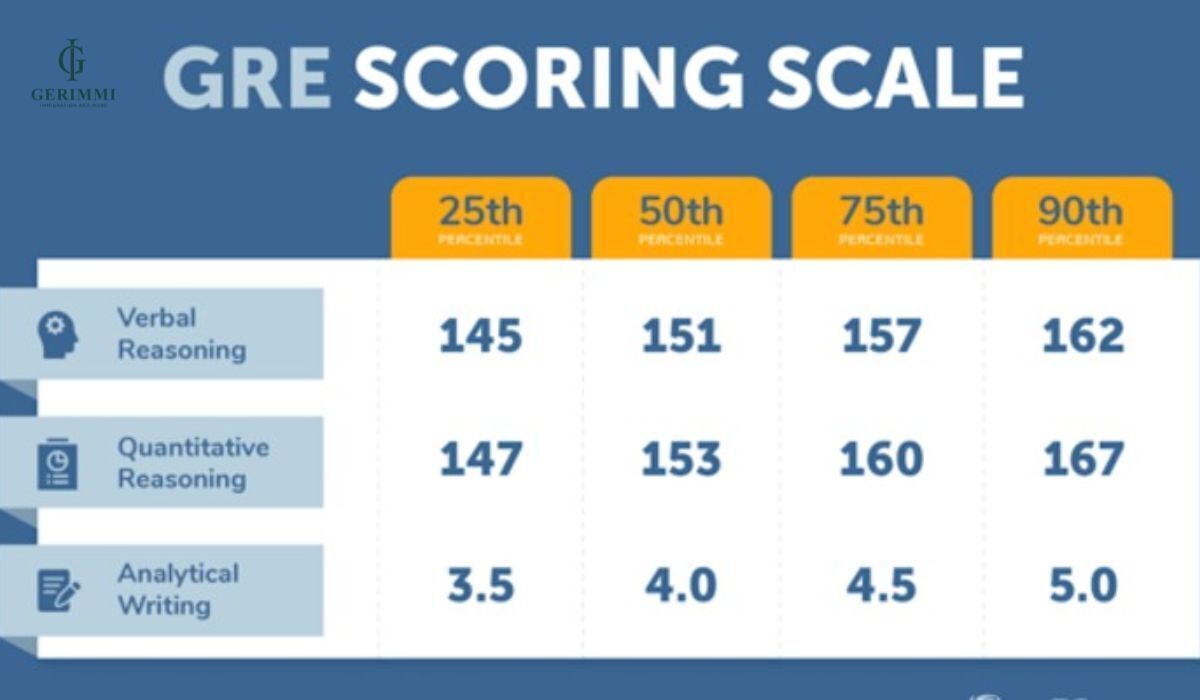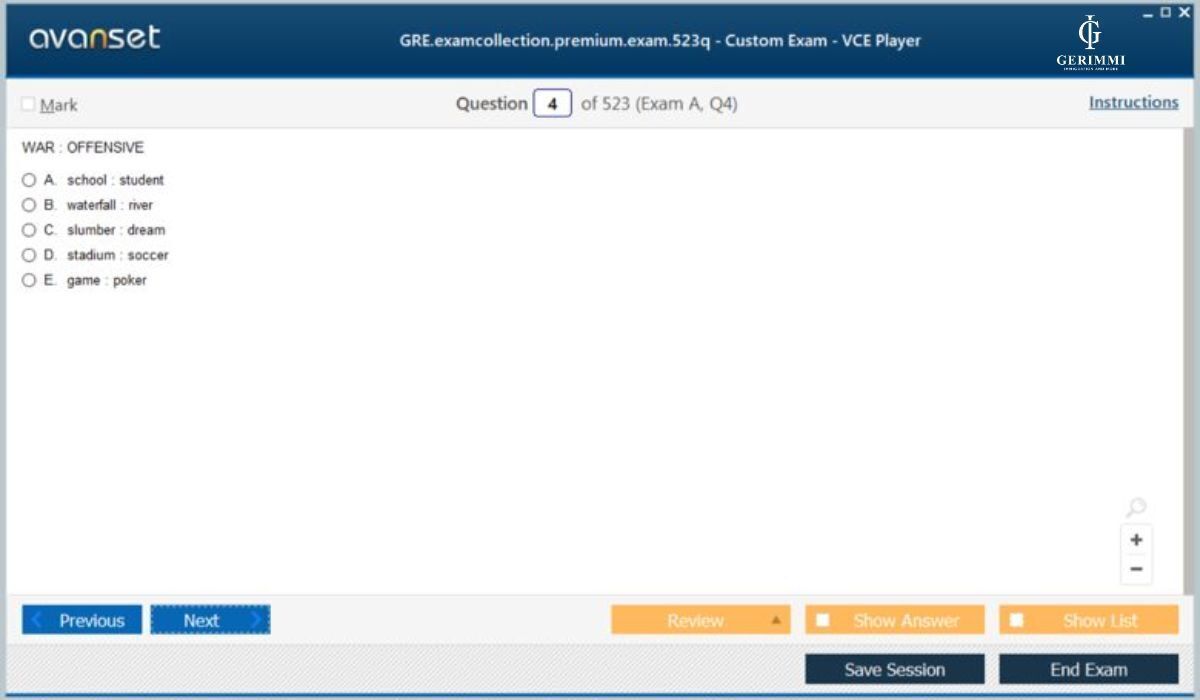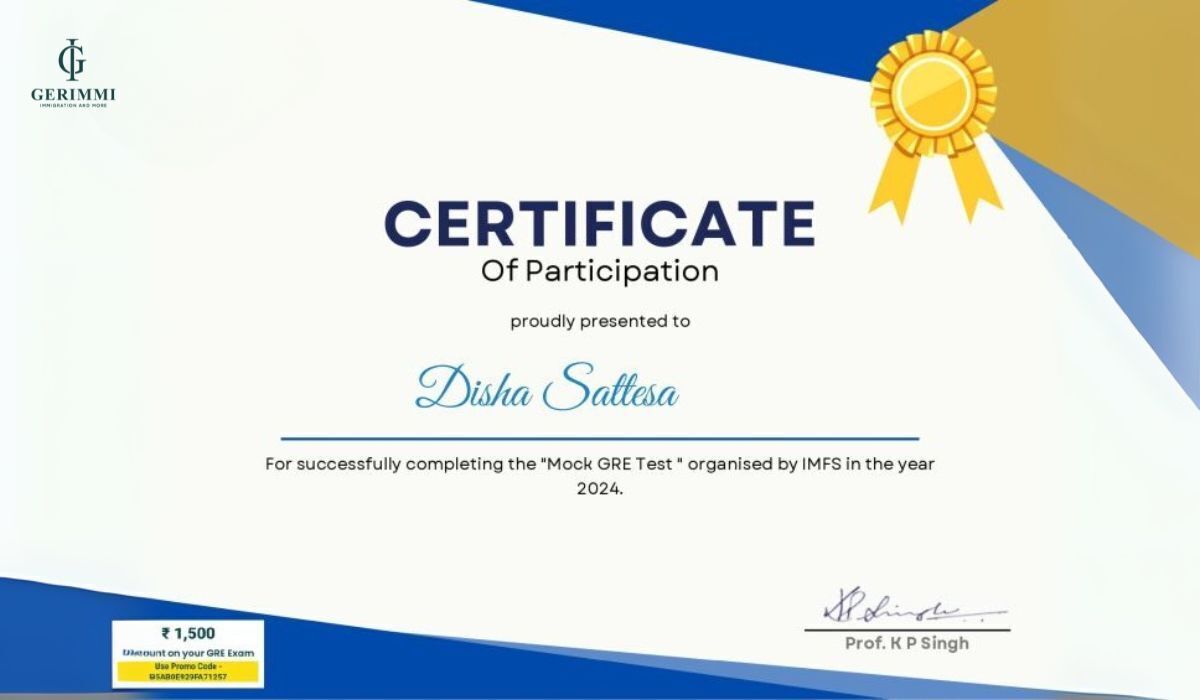If you are planning to study at the graduate level in the US, Canada or Europe, especially in fields such as science, engineering, social sciences or economics, then GRE certificate is almost an indispensable requirement. This is a test that assesses thinking, analytical and academic abilities, recognized by thousands of universities worldwide.
I. What is a GRE certificate?
GRE Certificate (Graduate Record Examination) is an international standardized test widely used in the college admissions process. Post-graduate at many universities and research institutes around the world, especially in the US, Canada and European countries. The GRE exam is administered and organized byETS (Educational Testing Service)Globally recognized educational testing organization.
This test assesses critical thinking, analytical skills, academic writing skills, as well as numerical skills and an understanding of academic vocabulary. These are essential skills that help schools assess readiness for master's and doctoral studies.

II. GRE certification exam structure
To prepare well for the exam, candidates need to clearly understand the structure of the GRE certification test, which is divided into two main types: GRE General Test and GRE Subject Test. Each type tests different abilities and is used in different admissions contexts depending on the requirements of each university.
1. GRE General Test
- Essay analysis
The Analytical Writing section consists of two tasks: “Issue” and “Argument”, each lasting 30 minutes. Candidates need to analyze a given problem or argument and present their views logically, with clear evidence. This section does not evaluate right/wrong views, but focuses on the ability to argue, express and think academically - essential skills when studying for a master's degree. A strong essay will significantly increase the value of theGRE certificate.
- Linguistic reasoning
Verbal Reasoning tests reading comprehension, complex sentence analysis, and specialized academic vocabulary. Each section has 20 questions and takes 30 minutes to complete. The content revolves around academic passages, fill-in-the-blank questions, and logical analysis. This section is a major challenge for non-native speakers. The results of this section reflect the ability to absorb academic materials while studying abroad.
- Quantitative thinking
The Quantitative Reasoning section assesses the ability to use basic mathematical concepts such as algebra, probability, geometry and data processing. Each section has 20 questions and takes 35 minutes to complete. Candidates must understand the questions quickly, analyze data accurately and apply formulas correctly. This is an easy section to score high if you practice well and have good logical thinking.

2. GRE Subject Test
- Subject specialization
The GRE Subject Test is a specialized knowledge test with subjects such as: Mathematics, Chemistry, Physics, Biology, English Literature and Psychology. The test takes about 170 minutes, in paper form. This is a tool to assess the depth of knowledge of the candidate in a specific field, very suitable for master's or doctoral research applications.
- Suitable for specific programs
Not all programs require this.GRE Subject Test Certificate, but many top schools (like MIT, Stanford, Harvard...) may require it when considering admission to more academic majors like Natural Sciences or Sociology. Submitting a Subject score demonstrates the applicant's seriousness and outstanding ability.
- Focus on fundamental theory
The questions focus on basic, academic knowledge but require deep understanding and the ability to link information. Although it does not require complex calculations, the exam requires systematic thinking, quick reactions and understanding of the nature of the subject.
- Not taking the test regularly
ETS only offers the GRE Subject Test a few times a year (usually in April, September, and October), with limited testing locations. Therefore, candidates should proactively monitor the test schedule, book early, and plan their study at least 3-6 months in advance.
III. GRE score scale & meaning
The GRE Certificate uses a detailed scoring system for each skill to comprehensively assess the candidate's academic ability. Understanding the scoring scale and the meaning of each section will help you set appropriate learning goals and choose the most effective testing strategy to optimize your score.
- Verbal & Quant Scores
Each section is scored between 130 and 170, in increments of 1 point. The combined score for both sections ranges from 260 to 340. Some schools require a higher Verbal score if you are studying Social Sciences, while Quant is preferred if you are studying Engineering or Science. The global average is around 150-152 for each section.
- Essay Score
The Writing section is scored on a scale of 0-6, increasing in increments of 0.5. Although this score accounts for only a small portion of the total score,GRE certificate, it has a big impact on your profile. A logical, coherent article, rich in practical examples and clearly structured will be rated much higher.
- Subject Test Score
With the GRE Subject Test, scores range from 200-990 depending on the subject, in 10-point increments. The average score varies by exam and by subject. For example, in Mathematics, the benchmark score for a top school might be 780+, while the average score is 660. Therefore, you need to compare your score with percentile to know the relative position.
- Point validity period
Scores are valid for five years from the test date. If you take the test multiple times, you can select your highest score to send to the school using the ScoreSelect feature. This is a great advantage for candidates who have a retest strategy to improve their study abroad or scholarship applications.

IV. Conditions & fees for GRE certification exam registration
Register for the examGRE certificate quite flexible and suitable for all subjects who have graduated or are about to graduate from university. Although there are no strict requirements on academic conditions, candidates need to ensure that they have all valid documents and prepare reasonable funds for exam fees and other related costs.
- No age limit
ETS does not impose an age limit for registering for the test. Most test takers are seniors, working professionals, or scholarship candidates preparing for study abroad. Preparing early will give you more options for test dates, locations, and study time.
- Identification required
When registering and entering the testing room, candidates are required to present their passport or international photo ID (depending on the country). The personal information on the ID must match 100% with the information registered on the ETS account. Inaccuracies may result in your refusal to take the test or loss of your fee.
- GRE Registration Fee
Exam feeGRE certificateThe General Test is $220 (subject to change by region). In addition to the main fee, you may incur additional costs to change your test date ($50), send additional scores to schools ($30 each), or purchase a writing review service. So, you should plan carefully to optimize costs.
- Unlimited retakes
GRE allows you to retake the test up to 5 times per year, with at least 21 days between each test. There is no limit to the number of times you take the test in your lifetime, giving you the flexibility to improve your score. However, the fee for each test is quite high, so you should consider carefully retaking the test when you are ready to improve your quality.GRE certificate.

V. Forms of GRE certification exam in Vietnam
Currently, candidates in Vietnam can choose from two formats of the GRE certification exam: computer-based and paper-based. Each format has different characteristics in terms of experience, time of organization and applicable subjects. Understanding these two formats will help you choose the option that best suits your needs and personal abilities.
1. Computer-based test
Computer-based testing is the most popular format forGRE General Test CertificateIn Vietnam, this exam is held several times a year at ETS authorized testing centers. Candidates will take the test directly on a computer in a strictly supervised testing room.
This test format has some outstanding advantages such as: quick operation, adjusting the order of questions in a section, reviewing and changing answers. In addition, you can receive unofficial results of the Verbal and Quant sections immediately after completing the test, helping to save waiting time. This is an ideal choice for those who want to optimize test performance and have proficient computer skills.

2. Paper-based test
Paper-based testing is mainly applied toGRE Subject Test Certificateand is only held a few times a year at fixed testing centers. The test will be distributed in the form of traditional paper questions, and candidates need to fill in the answers on the answer sheet according to the regulations.
Although less popular, paper-based testing is suitable for those who are used to reading and writing by hand or feel pressured when taking the test on a computer. However, the test results will take longer to process, usually taking 3 to 5 weeks. In addition, there is no function to review the questions you have done or change the difficulty level like when taking the test on a computer.
3. Compare the differences between computer-based and paper-based exams
|
Criteria |
Computer-Based |
Paper-Based |
|
Applicable certificate type |
GRE General Test |
GRE Subject Test |
|
Exam schedule |
Flexible, year round |
Limited, only a few times a year |
|
Exam location |
At testing centers there are computers. |
Certain ETS designated locations |
|
Time to receive points |
10-15 days (Verbal & Quant appear immediately after exam) |
3-5 weeks after exam date |
|
Ability to review questions |
Can review, mark and change answers |
Cannot go back to the sentence done |
|
Operation speed |
Fast, convenient, using mouse and keyboard |
Manual, fill in answer sheet |
|
Exam experience |
Computer screen, easier to switch sentences |
Paper and pen, suitable for people who are familiar with handicrafts |
|
Computer skills required |
Yes, computer proficiency required |
No computer skills required |
|
Popularity in Vietnam |
High, chosen by many candidates |
Limited, only when taking GRE Subject |
VI. Advantages and disadvantages of GRE certificate
The GRE certificate is increasingly chosen by many students and working people when planning to study abroad at the graduate level, especially in the US, Canada and Europe. However, besides the obvious benefits, the GRE also has some limitations that you need to understand to make a decision that is suitable for your study path. Below are the 4 most prominent advantages and disadvantages of this certificate:
1. Advantages
The GRE is accepted by more than 1,300 universities and graduate programs worldwide, not only in the United States but also in countries such as Canada, Australia, Germany, and the United Kingdom. Unlike the GMAT, which is business-specific, the GRE is more flexible and can be used for engineering, science, social sciences, and humanities. This is a big advantage if you are not yet clear about your major or want to expand your study abroad options.
The GRE allows you to change the order of questions within a section, mark questions you're unsure of, and go back and edit. Additionally, after you take the test, you can choose whether or not to send your scores, thanks to ETS's "ScoreSelect" feature. This gives you control over which scores are sent to schools, reducing testing stress and optimizing your scoring strategy.

2. Disadvantages
The Verbal Reasoning section of the GRE is notoriously difficult for non-native speakers, as it contains a lot of rare academic vocabulary. Questions require the ability to analyze context, guess word meanings, and deeply understand complex sentence structures. This is a major barrier that causes many people to study for a long time to achieve a high score on this section.
Although more and more business schools are acceptingGRE certificate, but the GMAT remains the preferred test for many top MBA programs. Some admissions or scholarships may value the GMAT more because of its emphasis on analytical and mathematical thinking. If your goal is solely to get an MBA, consider carefully between the two exams.
VII. Quick comparison of GRE and GMAT certificates
|
Criteria |
GRE Certificate |
GMAT Certificate |
|
Intended use |
Used for many different graduate programs |
Mainly for MBA, business administration program |
|
Organizing unit |
ETS (Educational Testing Service) |
GMAC (Graduate Management Admission Council) |
|
Main exam sections |
Analytical Writing, Verbal Reasoning, Quantitative Reasoning |
Analytical Writing, Integrated Reasoning, Verbal- Quantitative |
|
Flexibility |
You can choose to send or not send your test scores (ScoreSelect) |
No ScoreSelect - scores will be sent directly upon registration |
|
Ability to return to questions |
Can review and edit in the exam |
Cannot go back to the sentence done |
|
Math difficulty level |
Mathematics is more general and accessible |
Intensive math section, requiring high speed and logical thinking |
|
Language section |
Requires high academic vocabulary |
Focus on reading comprehension and language logic |
|
Exam fee (USD) |
About 220-230 USD |
About 275 USD |
|
Exam time |
About 3 hours 45 minutes |
About 3 hours 30 minutes |
|
Time with points |
10-15 days (GRE General) |
7-20 days |
|
Accredited by MBA |
Many MBA programs accept |
Is the most popular standard for MBA |
VIII. FAQ - Frequently asked questions about GRE certificate
1. How long is the GRE valid? (5 years)
The GRE is valid for five years from the date you take the test. This means that you can use your GRE score to apply to graduate programs for up to five years without having to retake the test, as long as the score is still valid. Therefore, you should plan to take the test early and consider the appropriate application time to maximize the value of the GRE.
2. How many times can I retake the test and how?
You can retake the GRE if you are not satisfied with your results. With the computer-based test, you can retake the test every 21 days, up to 5 times within 12 months (from the first test date). Each time you retake the test, you will have to register for a new test date and pay the normal fee. There is no limit to the number of times you can take the GRE in your lifetime, as long as you follow the rules regarding the distance and number of tests per year.
3. Should I take the General or Subject test?
Whether you choose to take the GRE General or GRE Subject depends on the requirements of the program you are applying to. The GRE General is the most popular test, used for most graduate and MBA programs. Meanwhile, the GRE Subject is only required if you are applying to specialized fields such as Biology, Chemistry, Mathematics or Physics, and some schools have specific requirements.
4. Which GRE score should I submit when applying?
With ETS’s ScoreSelect™ feature, you can choose which GRE test scores you’re most comfortable with, rather than having to send scores from all of your test attempts. This is especially helpful if you’ve taken the test multiple times and want to optimize your score profile. When you submit your scores, you simply select the test you’re most comfortable with, and the system will send only those scores to the schools you specify.
Conclusion
Hopefully with the detailed information in the article, you have a better understanding ofGRE certification as well as how to choose the test format and prepare for effective registration procedures. Planning your test preparation early, understanding the requirements of each school, and knowing the important milestones will help you save time and increase your chances of conquering your dream graduate programs.

